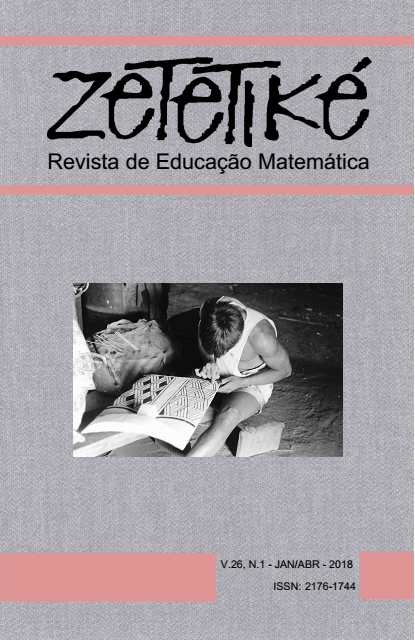Abstract
This work is a revised clipping and brings part of the reflections made in the master dissertation held and
defended at the Institute of Mathematical and Scientific Education of the Federal University of Pará, defended
by the author. It seeks to reflect on the contributions of ethnomathematics in the training of indigenous teachers
who attend the Indigenous Magisterium of the State of Tocantins. The course is offered by the Secretary of
Education of the State of Tocantins and works in the months of recess, for teachers who already work in the
schools of their respective villages, these are chosen by the community itself. The interest arose from the observation, where the author was a teacher teacher, of the difficulties encountered by Indian teachers who attend the Indian Magisterium in this state. These difficulties refer both to the understanding of the content of school mathematics and to its intersection with the aspects of its culture present in the everyday life of the village. The indigenous culture is rich in knowledge that can serve as a motivator of generating themes for classroom practices such as making objects and ritual rituals, body painting, ritual festivals and activities such as hunting, fishing, and activities and harvesting. This diversity involves traditional knowledge, in an integrated way, where mathematical knowledge is present. The research had as general objective to investigate how the ethnomathematical studies can contribute to the different relations and practices of the indigenous cultural environment, being able to be used as motivating elements in the school environment for the strengthening of indigenous cultural identity and particularly for the learning of mathematics. It had as a guiding question: why, with indigenous teachers having an arsenal that surrounds them in all their tasks, with their social practices, which encompass practices that we call mathematics, in full harmony with their cosmology, why these teachers do not use these assignments in your classes in general and more specifically in your math classes? How can we
recognize the facilities and impediments, referring to the indigenous teacher, in using the elements of indigenous culture itself in activities in Mathematics classes? The methodological procedures used are qualitative in approach and include various analytical tools used as field diary, interviews and travel reports. In this purpose, the research is based on Ethnomathematics and Bilingual Intercultural Education in the researches of D'Ambrosio (1990, 2002), Domite (2009), Cauty (2009), among others. The relation between these knowledge and school mathematics, from the ethnomathematical perspective, can add significant values in the understanding and apprehension of new knowledge without losing sight of its cultural richness, that is, from its
culture, appropriating knowledge that is of importance in the defense of their interests, in the relations established with the surrounding society. Finally, the paper indicates that, from the point of view of the conception of indigenous school education and bilingual intercultural education, this can be the guiding principle in the valorization of traditional knowledge, its experience and strengthening of relations, without losing sight of the appropriation of others knowledge, from other cultural practices.
References
Brasil (2002). Referencial Curricular Nacional para as Escolas Indígenas. Brasília, DF: MEC.
Cauty, A. (2009). Como nascem e se desenvolvem as tradições escritas matemáticas. Exemplos Mesoamericanos (pp.29-52). In M. C. C. B. Fantinato (Org.), Etnomatemática: novos desafios teóricos e pedagógicos. Niterói: Editora da UFF.
D’Ambrósio, U. (2002). Etnomatemática: elo entre as tradições e a modernidade. Belo Horizonte: Autêntica.
D’Ambrósio, U. (1990). Etnomatemática: arte e técnica de aprender. São Paulo: Ática.
Domite, M. C. S. (2009). Perspectivas e Desafios da Formação do Professor Indígena: O formador externo à cultura no centro das atenções. In M. C. C. B. Fantinato (Org.), Etnomatemática: novos desafios teóricos e pedagógicos. Niterói: Editora da UFF.
Ferreira, R. (2005). Educação Escolar Indígena e Etnomatemática: a pluralidade de um encontro na tragédia pós-moderna. Tese de Doutorado em Educação. São Paulo: Universidade de São Paulo.
Leme, H. A. S. (2010) Formação Superior de Professores Indígenas de Matemática em Mato Grosso do Sul: Acesso, Permanência e Desistência. Dissertação de Mestrado em Educação. São Paulo: Universidade de São Paulo.
Monteiro, A., & Pompeu Junior, G. (2001). A matemática e os temas transversais. São Paulo: Moderna.
Rodrigues-Monteiro, H. S. (2011). Magistério Indígena: contribuições da Etnomatemática para a formação dos professores indígenas do Estado do Tocantins. Dissertação de Mestrado em Educação em Ciências e Matemáticas. Belém: Universidade Federal do Pará.
Rodrigues-Monteiro, H. S. R. (2016). O Ensino de Matemática na Educação Escolar Indígena: (Im) possibilidades de tradução. Doutorado em Ensino de Ciências e Matemática. Campinas: Universidade Estadual de Campinas.
Scandiuzzi, P. P. (2009). Educação Indígena x Educação Escolar Indígena: uma relação etnocida em uma pesquisa etnomatemática. São Paulo: Editora UNESP.
Sebastiani Ferreira, E. (1994). A importância do conhecimento etnomatemático indígena na escola dos não-índios. Em Aberto, 14 (62), 89-95.

This work is licensed under a Creative Commons Attribution-NonCommercial-NoDerivatives 4.0 International License.
Copyright (c) 2018 Zetetike

